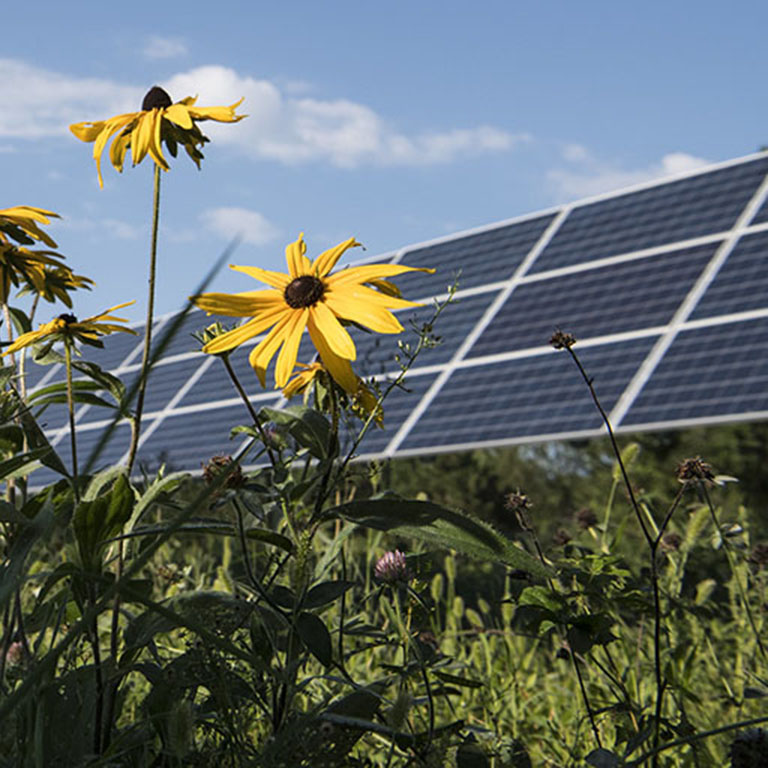Three Indiana communities are celebrating recent recognition as SolSmart communities, signaling their readiness for solar investment within their borders. After participating in the Environmental Resilience Institute’s 2021 Resilience Cohort, Carmel, Michigan City, and Zionsville were designated as SolSmart communities earlier this year.
SolSmart is a national program which recognizes cities, counties, and regional organizations for making it faster, easier, and more affordable for businesses and residents to take advantage of the economic and environmental benefits of solar energy. Carmel and Michigan City each earned a silver designation and Zionsville garnered a bronze designation. The communities join Indianapolis, Goshen, Plymouth, Nappanee, South Bend, Elkhart County, Marshall County, and St. Joseph County on the SolSmart Designee Map.
“For local governments, a key component of any climate action plan is increasing the use of renewable energy in their jurisdictions,” said ERI Resilience Implementation Manager Matt Flaherty. “The SolSmart designation process helps communities lower solar energy costs and increase uptake among businesses and residents, reducing greenhouse gas emissions and supporting local workforce development, while also increasing community resilience to power outages caused by extreme weather."
Last year, all three communities participated in the Resilience Cohort’s “Building a Solar-Ready Community” module. The program connected them to technical assistance and resources to fast-track the solar installation process for companies and residences, reduce red tape, and update zoning codes. City staff benefited from training sessions on solar permitting and inspections, as well as advice on how to grow their local solar market.
With its new designation, Zionsville is keeping an eye on the future of solar development in their town.
“I hope for our residents who haven’t thought about solar yet that they think again or anew about it,” said Carol Johnson, executive assistant to the Mayor of Zionsville. “I hope for installers it shows that as a government we are easy to work with when they’re installing these systems at residences and businesses.”
All three communities undertook significant actions to achieve their designations.
Carmel installed two solar projects on city property as part of their pursuit of a SolSmart designation. One project was installed at the city’s water treatment plant and the other at the city’s largest sewer lift station. Collectively, these two projects produce enough energy to power the annual electricity needs of over 1,200 homes.
Michigan City installed solar panels on four municipal properties and partnered with Solar United Neighbors Indiana to support installations on homes and small businesses. In addition, the city worked with the NAACP Soul Power Project to train individuals on solar installation across the community.
In 2020, Zionsville’s Town Hall joined the Boone County Solar Co-op, a cost-free initiative organized by Solar United Neighbors, to educate town and county residents about the benefits of solar energy while exploring bulk-purchasing opportunities for solar installations.
Each community started a webpage to clearly communicate their solar regulations to developers and their residents. (See web links below.)
As communities seek to earn their own SolSmart designation, Zionsville’s experiences can help guide their efforts.
“I think communities should know that there are many ways to achieve this designation,” Johnson said. “As you go through the process, make sure you coordinate closely with the managers and people in the correct departments who have to do the work, and you will be on a fast track for designation.”
Solar web pages: Carmel, Michigan City, Zionsville
About the Environmental Resilience Institute
Indiana University’s Environmental Resilience Institute brings together a broad coalition of government, business, nonprofit, and community leaders to help Indiana and the Midwest better prepare for the challenges of environmental change. By integrating research, education, and community, ERI is working to create a more sustainable, equitable, and prosperous future. Learn more at eri.iu.edu.



